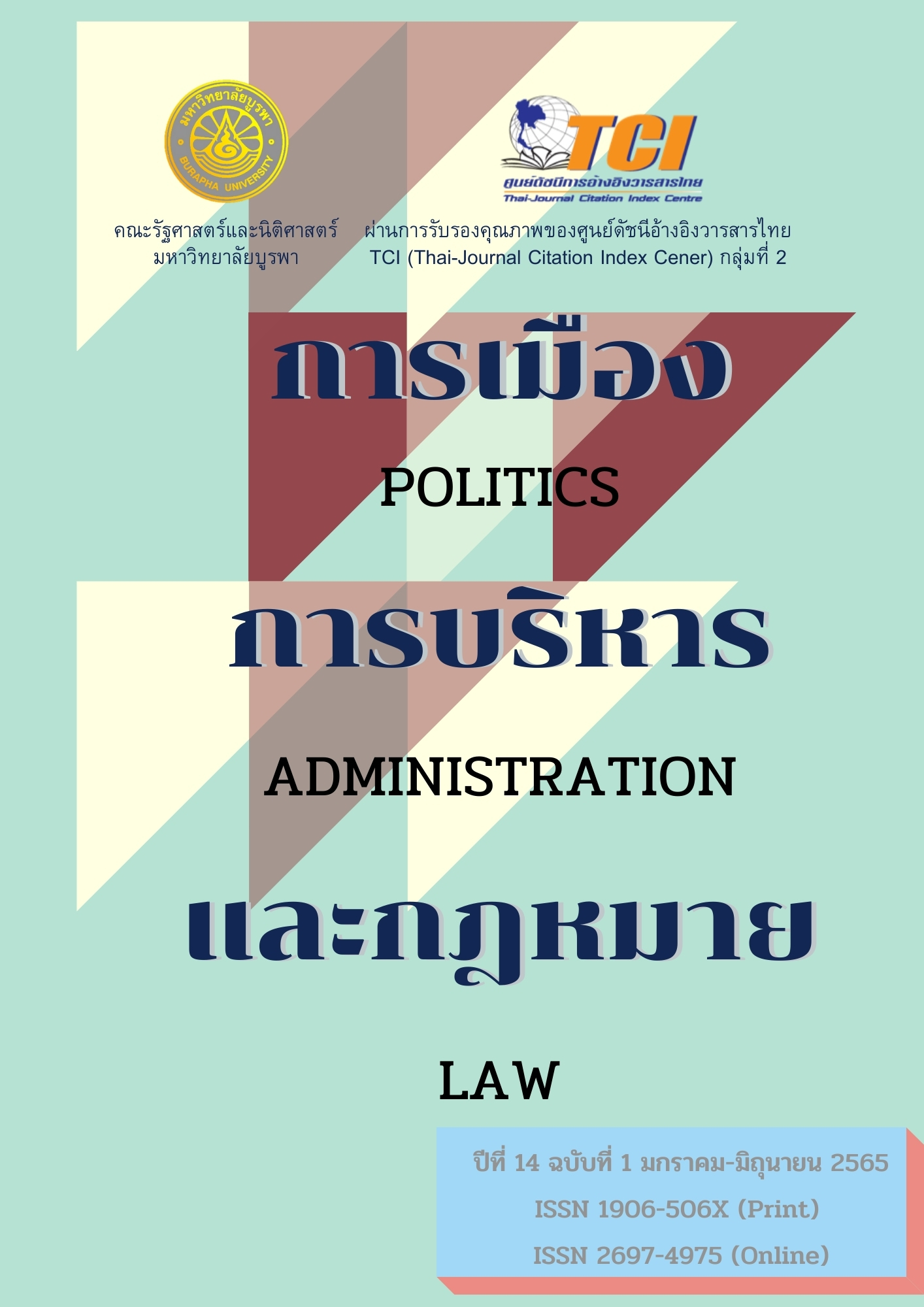The การพัฒนาประสิทธิภาพในการบังคับคดีแพ่ง ตามแนวคิดในการเยียวยาความเสียหายทางเศรษฐกิจ
คำสำคัญ:
บังคับคดี, นิติเศรษฐศาสตร์, ประสิทธิภาพบทคัดย่อ
บทคัดย่อ
บทความนี้เป็นบทความวิจัยที่กำหนดวัตถุประสงค์ในการวิจัยเพื่อ (1) ศึกษากฎหมาย แนวคิดและทฤษฎีในการบังคับคดีแพ่ง (2) ศึกษาสภาพปัญหากฎหมายและแนวคิดเกี่ยวกับการพัฒนาประสิทธิภาพในการบังคับคดีแพ่งตามแนวคิดในการเยียวยาความเสียหายทางเศรษฐกิจ (3) ศึกษาเชิงเปรียบเทียบกฎหมายและแนวคิดเกี่ยวกับการพัฒนาประสิทธิภาพในการบังคับคดีแพ่งตามแนวคิดในการเยียวยาความเสียหายทางเศรษฐกิจระหว่างของไทยกับต่างประเทศ (4) ร่างกฎหมายเพื่อพัฒนาประสิทธิภาพในการบังคับคดีแพ่งตามแนวคิดในการเยียวยาความเสียหายทางเศรษฐกิจ ผู้วิจัยใช้รูปแบบการวิจัยเชิงคุณภาพ โดยใช้วิธีการเก็บรวบรวมข้อมูลประกอบด้วย การวิจัยเชิงเอกสาร การสัมภาษณ์แบบเจาะลึกและการสนทนากลุ่ม โดยมีประชากรผู้ให้ข้อมูลเป็นผู้มีส่วนได้เสียซึ่งส่วนร่วมในการบังคับคดีที่แตกต่างกัน
ผลการวิจัยพบว่ากฎหมายบังคับคดียังมีสภาพปัญหามิได้มีการพัฒนาประสิทธิภาพในการบังคับคดีแพ่งให้เหมาะสมตามแนวคิดในการเยียวยาความเสียหายทางเศรษฐกิจ โดยการบังคับคดียังมิได้ดำเนินการแบบรัฐสวัสดิการที่รัฐนอกจากมีหน้าที่ดูแลสวัสดิการของประชาชนในเรื่องความยุติธรรมแล้ว รัฐจะต้องดำเนินการให้กระบวนการยุติธรรมให้มีประสิทธิภาพด้วย รัฐจะมีหน้าที่ดำเนินการบังคับคดีให้สำเร็จ การบังคับคดีมิใช่เรื่องการขวนขวายของคู่ความเท่านั้น เมื่อเปรียบเทียบกับกฎหมายต่างประเทศแล้วพบว่ากฎหมายบังคับคดียังไม่มีมาตรการที่มีประสิทธิภาพ ไม่ว่าด้านการเข้าถึงข้อมูล การกำหนดโทษที่เหมาะสม ประกอบกับกฎหมายกำหนดให้สถานะของเจ้าพนักงานบังคับคดีเป็นเจ้าหน้าที่ศาล มิได้เป็นผู้ใช้อำนาจกึ่งตุลาการที่มีอิสระและยังไม่มีกฎหมายเปิดช่องให้มีเจ้าพนักงานเอกชนวิชาชีพได้ อีกทั้งยังมีปัญหาในเรื่องคดีย้อนกลับไปพิจารณาไต่สวนที่ศาลได้โดยไม่จำเป็นอีกด้วย
เอกสารอ้างอิง
กิตติพงษ์ กิตยารักษ์.(2544).ยุทธศาสตร์ การปฏิรูป กระบวนการยุติธรรม ทางอาญาไทย , กรุงเทพ:
สำนักงานกองทุนสนับสนุนการวิจัย.
กรมบังคับคดี .(2559).รายงานประจำปี 2559. วันที่ค้นข้อมูล 12 พฤศจิกายน 2564, เข้าถึงได้จาก http://www.led.go.th/Policy/stat2.asp
กรมบังคับคดี.(2559).ความคืบหน้าการดำเนินการตามกรอบความยากง่ายในการประกอบธุรกิจ Ease of Doing Business. วันที่ค้นข้อมูล 11 กุมภาพันธ์ 2559, เข้าถึงได้จาก :http://www.led.go.th/doing/pdf/eodb_2.pdf
คณะเศรษฐศาสตร์ จุฬาลงกรณ์มหาวิทยาลัย.(2560). รายงานฉบับสมบูรณ์ โครงการ “การศึกษาผลกระทบด้านการผลักดันทรัพย์สินต่อระบบเศรษฐกิจไทย เพื่อพัฒนาสู่การเป็นศูนย์กลาง.วันที่ค้นข้อมูล 10 พฤศจิกายน 2564, เข้าถึงได้จาก http://www.led.go.th/doc/asia08012560.pdf
คณะนิติศาสตร์ มหาวิทยาลัยธรรมศาสตร์.(2559). โครงการยกระดับการบังคับคดีแพ่งให้เป็นไปตามมาตรฐานสากล วันที่ค้นข้อมูล 12 พฤศจิกายน 2564, เข้าถึงได้จากhttp://www.led.go.th/articles/pdf/ontop-pang.pdf
รังสรรค์ ธนะพรพันธุ์.(2545).เศรษฐกิจไทยหลังวิกฤติการณ์ ปี 2540, กรุงเทพ: โครงการจัดพิมพ์คบไฟ
Code of Civil Execution Procedure (สาธารณรัฐฝรั่งเศส).(2012).วันที่ค้นข้อมูล 1 พฤศจิกายน 2562, เข้าถึงได้จาก https://www.legifrance.gouv.fr/codes/texte_lc/LEGITEXT000025024948/2021-11-29/
European Commission for the Efficiency of Justice (CEPEJ).(2009) Guidelines for a Better Implementation of Existing Council of Europe’s Recommendation on Enforcement adopted by the CEPEJ at its 14th plenary meeting Strasbourg, 9 – 10 December 2009 วันที่ค้นข้อมูล 12 พฤศจิกายน 2564, เข้าถึงได้จาก https://rm.coe.int/16807473cd
European Commission on the Efficiency of Justice (CEPEJ) .(2020). Report of European judicial systems 2020 based on 2018 data วันที่ค้นข้อมูล 12 พฤศจิกายน 2564, เข้าถึงได้จากhttps://rm.coe.int/evaluation-report-part-1-english/16809fc058
Tribunals, Courts and Enforcement Act 2007.(ประเทศอังกฤษ).(2007).วันที่ค้นข้อมูล 1 สิงหาคม 2563, เข้าถึงได้จาก https://www.legislation.gov.uk/ukpga/2007/15/contents
World Bank Group. Doing Business.(2020).วันที่ค้นข้อมูล 22 ตุลาคม 2563, เข้าถึงได้จาก http://documents1.worldbank.org/curated/en/688761571934946384/pdf/Doing-Business-2020-Comparing-Business-Regulation-in-190-Economies.pdf
ดาวน์โหลด
เผยแพร่แล้ว
ฉบับ
ประเภทบทความ
สัญญาอนุญาต

อนุญาตภายใต้เงื่อนไข Creative Commons Attribution-NonCommercial-NoDerivatives 4.0 International License.






